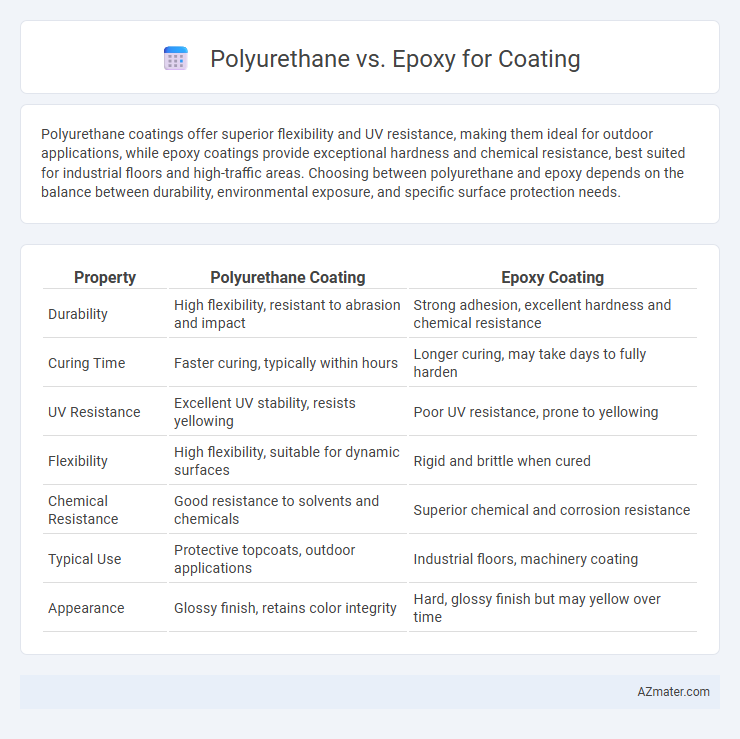Polyurethane coatings offer superior flexibility and UV resistance, making them ideal for outdoor applications, while epoxy coatings provide exceptional hardness and chemical resistance, best suited for industrial floors and high-traffic areas. Choosing between polyurethane and epoxy depends on the balance between durability, environmental exposure, and specific surface protection needs.
Table of Comparison
| Property | Polyurethane Coating | Epoxy Coating |
|---|---|---|
| Durability | High flexibility, resistant to abrasion and impact | Strong adhesion, excellent hardness and chemical resistance |
| Curing Time | Faster curing, typically within hours | Longer curing, may take days to fully harden |
| UV Resistance | Excellent UV stability, resists yellowing | Poor UV resistance, prone to yellowing |
| Flexibility | High flexibility, suitable for dynamic surfaces | Rigid and brittle when cured |
| Chemical Resistance | Good resistance to solvents and chemicals | Superior chemical and corrosion resistance |
| Typical Use | Protective topcoats, outdoor applications | Industrial floors, machinery coating |
| Appearance | Glossy finish, retains color integrity | Hard, glossy finish but may yellow over time |
Introduction to Polyurethane and Epoxy Coatings
Polyurethane coatings are renowned for their excellent flexibility, abrasion resistance, and ability to withstand UV exposure, making them ideal for exterior applications. Epoxy coatings provide superior chemical resistance, adhesion, and durability, commonly used in industrial flooring and protective surfaces. Both materials offer distinct advantages, with polyurethane excelling in weather resistance and epoxy in mechanical strength and chemical protection.
Key Differences Between Polyurethane and Epoxy
Polyurethane coatings offer superior flexibility and UV resistance, making them ideal for outdoor applications, while epoxy coatings provide exceptional hardness and chemical resistance, best suited for indoor use. Epoxy tends to cure faster and creates a thicker, more durable surface, whereas polyurethane cures slower but results in a more elastic and impact-resistant finish. The choice between polyurethane and epoxy depends on environmental exposure, desired durability, and application requirements.
Durability and Impact Resistance Comparison
Polyurethane coatings exhibit superior flexibility and impact resistance, making them ideal for surfaces subject to frequent mechanical stress or heavy traffic. Epoxy coatings provide exceptional hardness and chemical resistance but tend to be more brittle, which can lead to cracking or chipping under high impact. For applications demanding long-lasting durability combined with shock absorption, polyurethane offers a more resilient protective layer compared to the rigid nature of epoxy.
Chemical Resistance: Polyurethane vs Epoxy
Polyurethane coatings offer superior flexibility and abrasion resistance but generally exhibit lower chemical resistance compared to epoxy coatings, which provide excellent toughness and strong resistance to solvents, acids, and alkalis. Epoxy coatings form a denser, cross-linked polymer network, enhancing their ability to withstand harsh chemicals and industrial environments. For applications requiring high chemical durability, especially against aggressive solvents, epoxy is typically the preferred choice over polyurethane.
Application Methods and Ease of Use
Polyurethane coatings typically apply smoothly with brushes, rollers, or spray guns, offering flexibility and faster curing times that enhance ease of use on vertical and horizontal surfaces. Epoxy coatings require thorough surface preparation and often need precise mixing ratios before application with rollers or squeegees, which can complicate the process for beginners. Polyurethane's superior elasticity and simpler application make it more user-friendly for DIY projects, while epoxy's harder finish demands careful handling to achieve optimal results.
Curing Time and Project Timelines
Polyurethane coatings typically cure faster than epoxy, with drying times ranging from 4 to 8 hours compared to epoxy's 12 to 24 hours, significantly impacting project timelines. The quicker curing time of polyurethane allows for faster return to service, making it ideal for projects requiring rapid turnaround. Epoxy's longer curing period provides a harder, more durable finish but extends the overall project duration, which is crucial when planning detailed schedules.
Aesthetic Options and Finish Qualities
Polyurethane coatings offer a wide range of aesthetic options, including gloss, satin, and matte finishes, providing superior UV resistance and color retention for outdoor applications. Epoxy coatings deliver a highly durable, glossy finish that enhances color vibrancy and chemical resistance but may yellow over time when exposed to sunlight. Both materials provide excellent adhesion and protective qualities, with polyurethane favored for its flexibility and epoxy valued for its superior hardness and abrasion resistance.
Cost Analysis: Polyurethane vs Epoxy
Polyurethane coatings generally cost more upfront than epoxy due to higher material prices and longer curing times, but offer superior UV resistance and flexibility, which can reduce maintenance expenses in outdoor applications. Epoxy coatings are more affordable initially and provide excellent adhesion and chemical resistance, making them cost-effective for indoor environments requiring durability. Considering lifecycle costs, polyurethane may deliver better value over time in settings exposed to sunlight and wear, while epoxy remains economical for controlled indoor uses.
Typical Use Cases and Industry Applications
Polyurethane coatings are predominantly used in automotive, industrial machinery, and flooring applications due to their superior flexibility and UV resistance, making them ideal for exterior surfaces and areas exposed to sunlight. Epoxy coatings excel in heavy-duty industrial environments such as warehouses, factories, and marine applications because of their exceptional chemical resistance, hardness, and strong adhesion to concrete and metal substrates. Both materials serve critical roles in protective coatings, with polyurethane favored for its durability and aesthetic finish, while epoxy is preferred for its toughness and resistance to abrasion and chemicals.
Choosing the Right Coating for Your Needs
Polyurethane coatings offer superior flexibility, UV resistance, and abrasion protection, making them ideal for surfaces exposed to sunlight and frequent wear. Epoxy coatings provide exceptional chemical resistance and hardness, suitable for industrial floors and areas requiring strong adhesion and durability. Selecting the right coating depends on the environment, exposure conditions, and desired longevity of the coated surface.

Infographic: Polyurethane vs Epoxy for Coating
 azmater.com
azmater.com